小学英语一般现在时(二)知识点及练习题
小学英语一般现在时专项练习

小学英语一般现在时专项练习什么是一般现在时一般现在时是英语中最基本的时态,用来表述经常性、习惯性的动作或状态。
在一般现在时中,动词的形式保持不变,不论主语是谁。
一般现在时的使用规则以下是一般现在时的使用规则:1.表示经常性或习惯性的动作或状态,如:I play football every Sunday.(我每个星期天都踢足球。
)2.表示现在的真理或客观事实,如:The sun rises in the east. (太阳从东方升起。
)3.表示时间表、日程安排或事实陈述,如:The train leaves at 6 o’clock.(火车六点钟离开。
)如何构成一般现在时构成一般现在时的规则如下:1.如果主语是第三人称单数(he, she, it),动词要加上-s或-es,例如:She plays tennis every day. (她每天打网球。
)2.如果主语是第一人称、第二人称或复数形式,动词保持原形,例如:I play football every Sunday. (我每个星期天都踢足球。
)或 They playbasketball after school. (他们放学后打篮球。
)一般现在时的特殊情况一般现在时有一些特殊的情况需要注意:1.如果动词以辅音字母+y结尾,将y改为i再加es,例如:study ->studies (学习)2.如果动词以s, x, ch, sh结尾,加es,例如:watch -> watches (观看)3.如果动词以o结尾,可以直接加es,例如:go -> goes (去)一般现在时练习题1.My brother ________________ (study) English every day.2.T he train ________________ (leave) at 7 o’clock.3.She always ________________ (watch) TV in the evening.4.They ________________ (play) basketball on Saturdays.5.The cat ________________ (catch) mice in the garden.6.My parents ________________ (work) in the office.7.Lucy and Lily ________________ (go) to school by bus.8.The dog ________________ (bark) at strangers.答案: 1. studies 2. leaves 3. watches 4. play 5. catches 6. work 7. go 8. barks总结一般现在时是英语中最基本的时态,用于描述经常性、习惯性的动作或状态。
小学英语语法集训2-一般现在时(含实义动词)

语法集训资料2一般现在时(含有实义动词)(一)行为动词:及实义动词,表示具体动作的动词。
句型变换口诀:一般现在时,没有be动词;无be找助,助提前,动还原。
(二)第三人称单数变化规则:1)一般情况下,动词后面直接加 -s。
eg:work-works get-gets say-says read- reads2)以ch,sh,s,x或o结尾的动词,在后面加 -es。
口诀:以蛇(S)吃(Ch)烈酒(XO)晕死了(Sh)eg : go-goes teach-teaches wash-washes do-does fix -fixes3)以“辅音+y”结尾的动词,改y为i加es。
eg: study- studies try-tries carry-carries fly-flies cry-cries(三)三单:概念:指第三人称单数,he,she,it或者能够被he,she,it代替的单数名词。
eg: my brother, Lily, his mother练一练:一、用所给词的正确形式填空1. We often___________(play) on the playground.2. He _________(get) up at six o’clock.3. Danny _______(study) English, Chinese, Maths, Science and Art at school.4. Mike sometimes __________(go) to the park with his sister.5. At eight at night, she ________(watch) TV with his parents.6.What____ (do) he usually _____(do) after school?7.__________you _________(brush) your teeth every morning?8.________ Mike________(read) English every day?9. How many lessons ______your classmate____(have) on Monday?10. What time _______ his mother _________(do) the housework?二、改句子1. Do you often play football after school? (肯定回答)___________________________________________________________ 2. I have many books. (改为否定句)____________________________________________________________ 3. Lucy’s sister likes playing table tennis. (改为否定句)____________________________________________________________ 4. She lives in a small town near New York. (改为一般疑问句)_____________________________________________________________ 5. She watches TV every day. (否定句)———————————————————————————6.David has a goal. (改为一般疑问句)————————————————————————————三、写出下列动词的第三人称单数形式:1. wash_________ match _______guess______ study______ finish_________ go________ snow______ carry_________2. stop______ see________ drive ________let_______ carry______ keep_____ join______ find_______ think________ teach______ catch______四、单项选择:1. He sits down and ______ a rest.A. havingB. haveC. to haveD. has2. The picture _______ nice.A. looksB. is lookedC. lookD. is looking3. She ______ down and soon falls asleep.A. liveB. lainC. laidD. sits6. The plane ______ over there.A. isB. areC.amD. was4. The teacher ________us to come to school on time.A. askB. askingC. asksD. asked5. John always ______ others.A. helpB. helpingC. helpsD. to help6. He ______for eight hours every day.A. workingB. to workC. worksD. worked五、改错1. Is your brother speak English?————————————————————————2.Does he likes going fishing?_____________________________________________________________ 3. He likes play games after class._____________________________________________________________4. Mr. Wu teachs us English.______________________________________________________________ 5. She don’t do her homework every evening.______________________________________________________________。
一般现在时知识点梳理及经典练习(超详细)
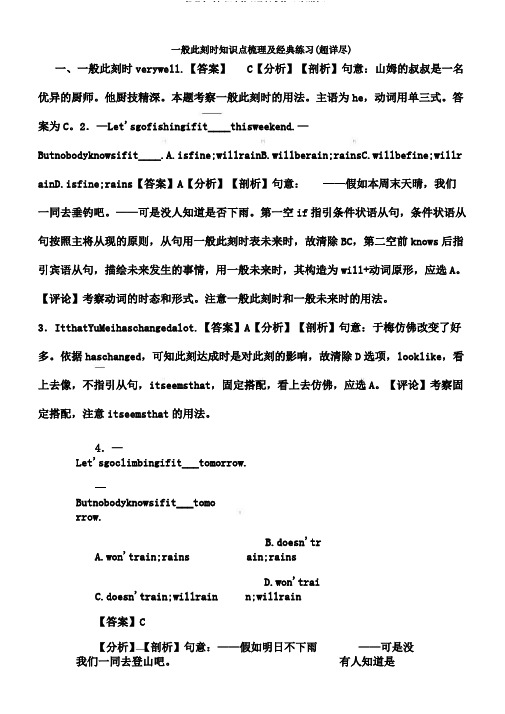
一般此刻时知识点梳理及经典练习(超详尽)一、一般此刻时verywell.【答案】C【分析】【剖析】句意:山姆的叔叔是一名优异的厨师。
他厨技精深。
本题考察一般此刻时的用法。
主语为he,动词用单三式。
答案为C。
2.—Let'sgofishingifit____thisweekend.—Butnobodyknowsifit____.A.isfine;willrainB.willberain;rainsC.willbefine;willr ainD.isfine;rains【答案】A【分析】【剖析】句意:——假如本周末天晴,我们一同去垂钓吧。
——可是没人知道是否下雨。
第一空if指引条件状语从句,条件状语从句按照主将从现的原则,从句用一般此刻时表未来时,故清除BC,第二空前knows后指引宾语从句,描绘未来发生的事情,用一般未来时,其构造为will+动词原形,应选A。
【评论】考察动词的时态和形式。
注意一般此刻时和一般未来时的用法。
3.ItthatYuMeihaschangedalot.【答案】A【分析】【剖析】句意:于梅仿佛改变了好多。
依据haschanged,可知此刻达成时是对此刻的影响,故清除D选项,looklike,看上去像,不指引从句,itseemsthat,固定搭配,看上去仿佛,应选A。
【评论】考察固定搭配,注意itseemsthat的用法。
4.—Let'sgoclimbingifit___tomorrow.—Butnobodyknowsifit___tomorrow.A.won'train;rainsB.doesn'tr ain;rainsC.doesn'train;willrainD.won'trai n;willrain【答案】C【分析】【剖析】句意:——假如明日不下雨我们一同去登山吧。
——可是没有人知道是否明日会不会下雨。
if指引的条件状语从句,按照主将从现的原则,第一空,if 指引条件状语从句,从句用一般此刻时,第一空填doesn'train,第二空if,能否,指引宾语从句,依据tomorrow,可知宾语从句用一般未来时,第二空填willrain,应选C。
小学英语六年级所有时态综合练习
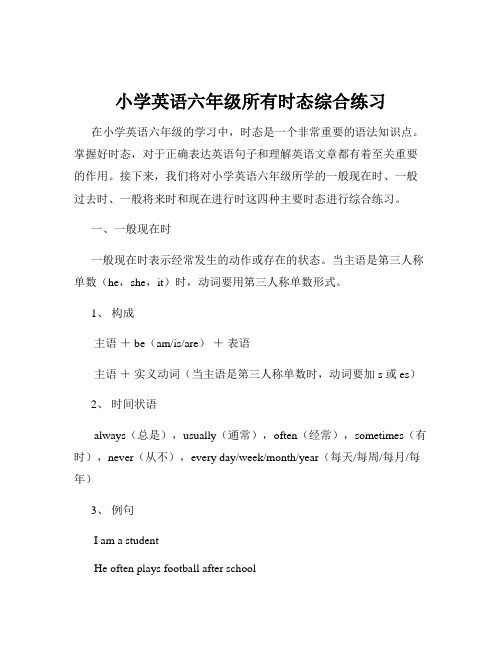
小学英语六年级所有时态综合练习在小学英语六年级的学习中,时态是一个非常重要的语法知识点。
掌握好时态,对于正确表达英语句子和理解英语文章都有着至关重要的作用。
接下来,我们将对小学英语六年级所学的一般现在时、一般过去时、一般将来时和现在进行时这四种主要时态进行综合练习。
一、一般现在时一般现在时表示经常发生的动作或存在的状态。
当主语是第三人称单数(he,she,it)时,动词要用第三人称单数形式。
1、构成主语+ be(am/is/are)+表语主语+实义动词(当主语是第三人称单数时,动词要加 s 或 es)2、时间状语always(总是),usually(通常),often(经常),sometimes(有时),never(从不),every day/week/month/year(每天/每周/每月/每年)3、例句I am a studentHe often plays football after schoolThey are very happy练习:1、 My father ______ (watch) TV every night2、 She ______ (like) music very much3、 The children often ______ (play) in the park二、一般过去时一般过去时表示过去发生的动作或存在的状态。
1、构成主语+ was/were +表语主语+动词的过去式2、时间状语yesterday(昨天),last week/month/year(上周/上个月/去年),ago(以前),in +过去的年份3、例句I was at home yesterdayThey played basketball last weekHe went to Beijing two years ago练习:1、 We ______ (have) a party last night2、 She ______ (buy) a new dress yesterday3、 He ______ (do) his homework an hour ago三、一般将来时一般将来时表示将来要发生的动作或存在的状态。
【英语】一般现在时知识点总结及经典习题(含答案)
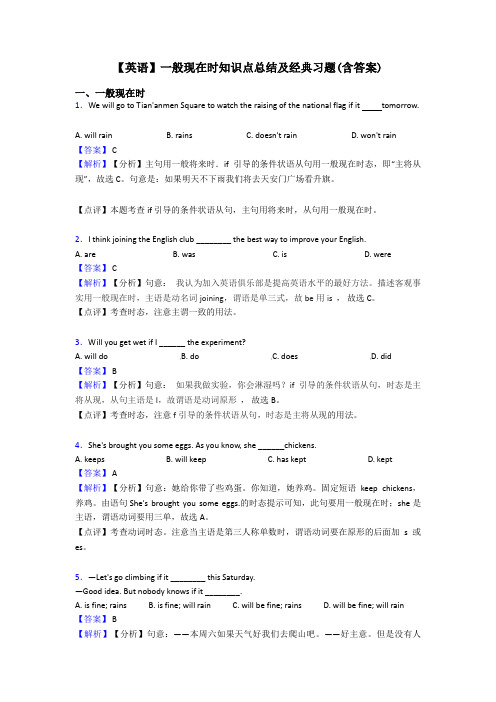
【英语】一般现在时知识点总结及经典习题(含答案)一、一般现在时1.We will go to Tian'anmen Square to watch the raising of the national flag if it tomorrow.A. will rainB. rainsC. doesn't rainD. won't rain【答案】 C【解析】【分析】主句用一般将来时.if引导的条件状语从句用一般现在时态,即“主将从现”,故选C。
句意是:如果明天不下雨我们将去天安门广场看升旗。
【点评】本题考查if 引导的条件状语从句,主句用将来时,从句用一般现在时。
2.I think joining the English club ________ the best way to improve your English.A. areB. wasC. isD. were【答案】 C【解析】【分析】句意:我认为加入英语俱乐部是提高英语水平的最好方法。
描述客观事实用一般现在时,主语是动名词joining,谓语是单三式,故be用is,故选C。
【点评】考查时态,注意主谓一致的用法。
3.Will you get wet if I ______ the experiment?A. will doB. doC. doesD. did【答案】 B【解析】【分析】句意:如果我做实验,你会淋湿吗?if引导的条件状语从句,时态是主将从现,从句主语是 I,故谓语是动词原形,故选B。
【点评】考查时态,注意f引导的条件状语从句,时态是主将从现的用法。
4.She's brought you some eggs. As you know, she ______chickens.A. keepsB. will keepC. has keptD. kept【答案】 A【解析】【分析】句意:她给你带了些鸡蛋。
小学英语语法知识点一般现在时
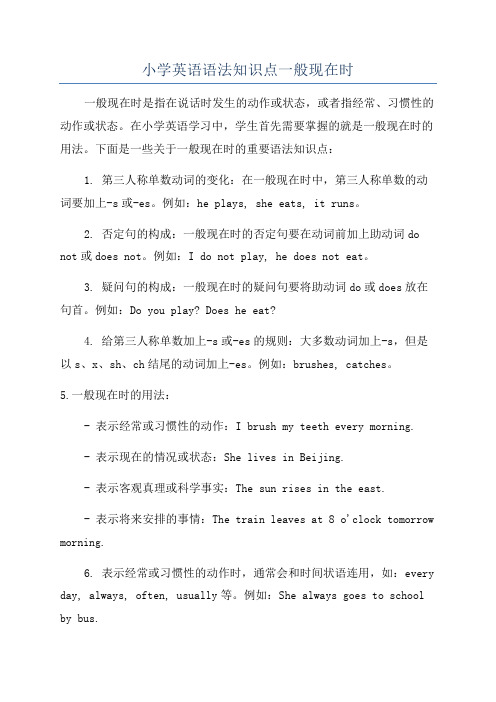
小学英语语法知识点一般现在时一般现在时是指在说话时发生的动作或状态,或者指经常、习惯性的动作或状态。
在小学英语学习中,学生首先需要掌握的就是一般现在时的用法。
下面是一些关于一般现在时的重要语法知识点:1. 第三人称单数动词的变化:在一般现在时中,第三人称单数的动词要加上-s或-es。
例如:he plays, she eats, it runs。
2. 否定句的构成:一般现在时的否定句要在动词前加上助动词do not或does not。
例如:I do not play, he does not eat。
3. 疑问句的构成:一般现在时的疑问句要将助动词do或does放在句首。
例如:Do you play? Does he eat?4. 给第三人称单数加上-s或-es的规则:大多数动词加上-s,但是以s、x、sh、ch结尾的动词加上-es。
例如:brushes, catches。
5.一般现在时的用法:- 表示经常或习惯性的动作:I brush my teeth every morning.- 表示现在的情况或状态:She lives in Beijing.- 表示客观真理或科学事实:The sun rises in the east.- 表示将来安排的事情:The train leaves at 8 o'clock tomorrow morning.6. 表示经常或习惯性的动作时,通常会和时间状语连用,如:every day, always, often, usually等。
例如:She always goes to school by bus.7. 表示现在的情况或状态时,通常与be动词连用,如:am, is, are。
例如:I am a student.8. 表示客观真理或科学事实时,通常不和时间状语连用。
例如:Water boils at 100 degrees Celsius.9.一般现在时中的一些特殊用法:- 示意要求或建议的动词(如:want, need, like, love, hate等)后接不定式,用法类似于祈使句。
小学英语的四种时态知识点
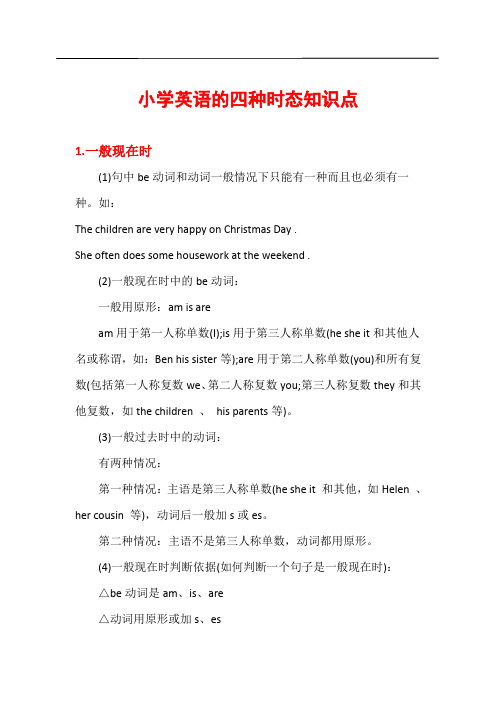
小学英语的四种时态知识点1.一般现在时(1)句中be动词和动词一般情况下只能有一种而且也必须有一种。
如:The children are very happy on Christmas Day .She often does some housework at the weekend .(2)一般现在时中的be动词:一般用原形:am is aream用于第一人称单数(I);is用于第三人称单数(he she it和其他人名或称谓,如:Ben his sister等);are用于第二人称单数(you)和所有复数(包括第一人称复数we、第二人称复数you;第三人称复数they和其他复数,如the children 、his parents等)。
(3)一般过去时中的动词:有两种情况:第一种情况:主语是第三人称单数(he she it 和其他,如Helen 、her cousin 等),动词后一般加s或es。
第二种情况:主语不是第三人称单数,动词都用原形。
(4)一般现在时判断依据(如何判断一个句子是一般现在时):△be动词是am、is、are△动词用原形或加s、es△没有时间状语或有usually、often、everyday、sometimes等不是具体的时间(5)有用的的依据:Be动词是is、am ←→名词用原形(这里包括可数名词的单数和不可数名词)Be动词是are ←→名词加s或es动词加s或es ←→主语是第三人称单数动词用原形←→主语不是第三人称单数(6)情态动词:我们现在学过的情态动词有:can、must、should、would。
情态动词后动词总是用原形。
(不受其他任何条件影响)2.一般过去时(1)句中be动词和动词一般情况下只能有一种而且也必须有一种。
如:The girls were on the grass just now .They visited my parents last weekend .(2)一般过去时中的be动词:一般用过去式:was werewas用于第一人称单数(I)和第三人称单数(he she it和其他人名或称谓,如:Ben 、his sister等);were用于第二人称单数(you)和所有复数(包括第一人称复数we、第二人称复数you;第三人称复数they 和其他复数,如the children 、his parents等)。
小学英语一般现在时专项练习
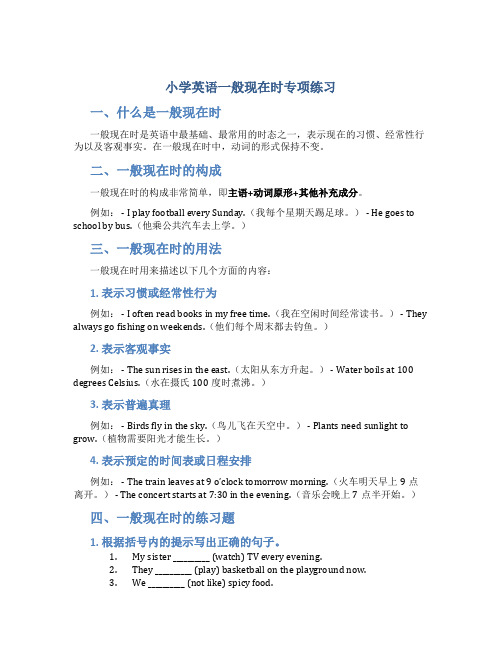
小学英语一般现在时专项练习一、什么是一般现在时一般现在时是英语中最基础、最常用的时态之一,表示现在的习惯、经常性行为以及客观事实。
在一般现在时中,动词的形式保持不变。
二、一般现在时的构成一般现在时的构成非常简单,即主语+动词原形+其他补充成分。
例如: - I play football every Sunday.(我每个星期天踢足球。
) - He goes to school by bus.(他乘公共汽车去上学。
)三、一般现在时的用法一般现在时用来描述以下几个方面的内容:1. 表示习惯或经常性行为例如: - I often read books in my free time.(我在空闲时间经常读书。
) - They always go fishing on weekends.(他们每个周末都去钓鱼。
)2. 表示客观事实例如: - The sun rises in the east.(太阳从东方升起。
) - Water boils at 100 degrees Celsius.(水在摄氏100度时煮沸。
)3. 表示普遍真理例如: - Birds fly in the sky.(鸟儿飞在天空中。
) - Plants need sunlight to grow.(植物需要阳光才能生长。
)4. 表示预定的时间表或日程安排例如: - The train leaves at 9 o’clock tomorrow morning.(火车明天早上9点离开。
) - The concert starts at 7:30 in the evening.(音乐会晚上7点半开始。
)四、一般现在时的练习题1. 根据括号内的提示写出正确的句子。
1.My sister __________ (watch) TV every evening.2.They __________ (play) basketball on the playground now.3.We __________ (not like) spicy food.4.The dog __________ (bark) loudly at strangers.5.She __________ (do) her homework after school every day. 2. 选择适当的词填空,完成下列句子。
五年级下英语:一般现在时及习题

五年级下册英语重点语法解析:一般现在时小学五年级英语下册有三大重点语法:一般现在时、一般进行时、一般将来时。
这三大时态是我们学好英语的基础,必须要牢牢掌握。
助手将和大家详细解析以上三大时态的用法,今天我们先来学习“一般现在时”。
一般现在时是小学英语的重要语法知识点,也是上了初中后要学习的最重要的语法内容之一。
一般现在时主要用来表示经常性或习惯性的动作,或者是现在的特征或所处的状态。
一般现在时看似最简单,其实它和其它时态最不一样。
其它时态说的都是具体时间发生的具体事件,而一般现在时强调的是一段时间内的状态或反复发生的动作,即客观事实。
1. 谓语是be(am/is/are)的一般现在时。
①肯定形式:主语+be+表语(形容词、名词充当表语)。
I am hungry.You are beautiful.He is a doctor.②否定形式:主语+be+not+表语(形容词、名词充当表语)。
I am not hungry.You aren't beautiful.He isn't a doctor.③一般疑问句形式:Be+主语+表语(形容词、名词充当表语)? 肯定回答:Yes,主语+be. 否定回答:No, 主语+ be+not.—Are you hungry?—Yes,I am./No,I'm not.—Is he a doctor?—Yes, he is./No, he isn,t.④特殊疑问句形式:特殊疑问词+Be开头的一般疑问句?—What is he?—He is a doctor.注意:be要随着主语变。
2. 谓语是情态动词can/may.....+动词原形的一般现在时。
①肯定形式:主语+情态动词can/may.....+动词原形+宾语。
I can finish my homework.②否定形式:主语+情态动词can/may.....+not+动词原形+宾语。
I can't finish my homework.③一般疑问句形式:情态动词Can/May.....+主语+动词原形+主语+宾语。
小学英语时态必背知识点
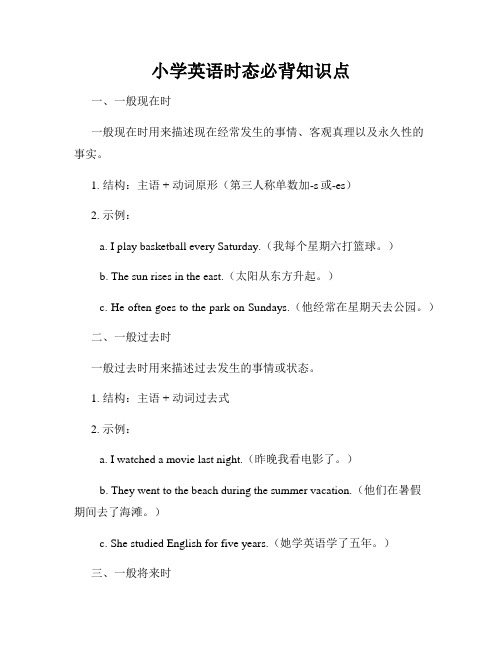
小学英语时态必背知识点一、一般现在时一般现在时用来描述现在经常发生的事情、客观真理以及永久性的事实。
1. 结构:主语 + 动词原形(第三人称单数加-s或-es)2. 示例:a. I play basketball every Saturday.(我每个星期六打篮球。
)b. The sun rises in the east.(太阳从东方升起。
)c. He often goes to the park on Sundays.(他经常在星期天去公园。
)二、一般过去时一般过去时用来描述过去发生的事情或状态。
1. 结构:主语 + 动词过去式2. 示例:a. I watched a movie last night.(昨晚我看电影了。
)b. They went to the beach during the summer vacation.(他们在暑假期间去了海滩。
)c. She studied English for five years.(她学英语学了五年。
)三、一般将来时一般将来时用于表达将来的动作或计划。
1. 结构:主语 + will + 动词原形2. 示例:a. We will have a picnic next weekend.(下周末我们要去野餐。
)b. He will visit his grandparents tomorrow.(明天他要去看望他的祖父母。
)c. I will call you later.(我待会儿给你打电话。
)四、现在进行时现在进行时用来描述现在正在进行的动作。
1. 结构:主语 + am/is/are + 动词-ing形式2. 示例:a. She is reading a book now.(她正在看书。
)b. They are playing soccer in the park.(他们正在公园里踢足球。
)c. We are studying for the English test.(我们正在为英语考试学习。
英语语法知识点及专项训练(一般现在时)
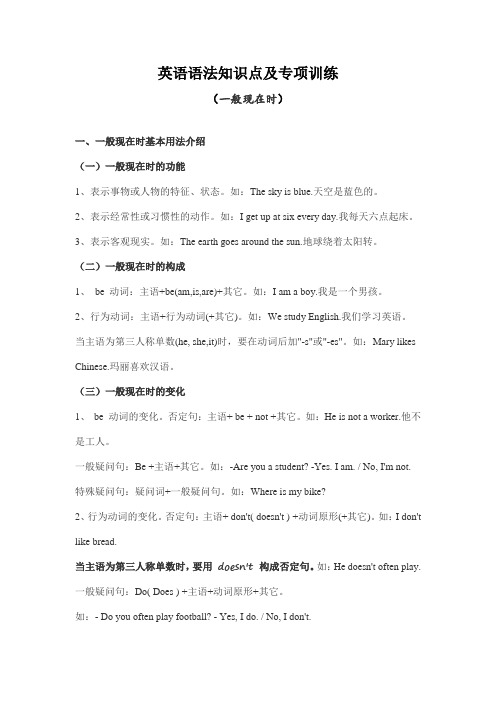
英语语法知识点及专项训练(一般现在时)一、一般现在时基本用法介绍(一)一般现在时的功能1、表示事物或人物的特征、状态。
如:The sky is blue.天空是蓝色的。
2、表示经常性或习惯性的动作。
如:I get up at six every day.我每天六点起床。
3、表示客观现实。
如:The earth goes around the sun.地球绕着太阳转。
(二)一般现在时的构成1、be 动词:主语+be(am,is,are)+其它。
如:I am a boy.我是一个男孩。
2、行为动词:主语+行为动词(+其它)。
如:We study English.我们学习英语。
当主语为第三人称单数(he, she,it)时,要在动词后加"-s"或"-es"。
如:Mary likes Chinese.玛丽喜欢汉语。
(三)一般现在时的变化1、be 动词的变化。
否定句:主语+ be + not +其它。
如:He is not a worker.他不是工人。
一般疑问句:Be +主语+其它。
如:-Are you a student? -Yes. I am. / No, I'm not. 特殊疑问句:疑问词+一般疑问句。
如:Where is my bike?2、行为动词的变化。
否定句:主语+ don't( doesn't ) +动词原形(+其它)。
如:I don't like bread.当主语为第三人称单数时,要用doesn't 构成否定句。
如:He doesn't often play. 一般疑问句:Do( Does ) +主语+动词原形+其它。
如:- Do you often play football? - Yes, I do. / No, I don't.当主语为第三人称单数时,要用does 构成一般疑问句。
小学英语语法及练习题
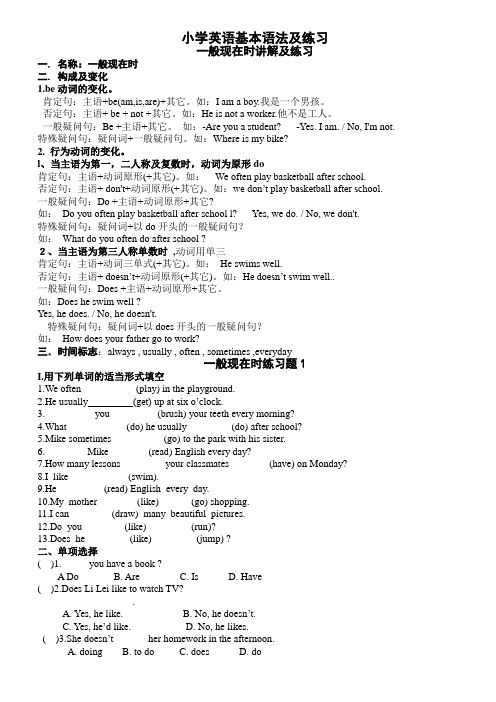
小学英语基本语法及练习一般现在时讲解及练习一. 名称:一般现在时二. 构成及变化1.be动词的变化。
肯定句:主语+be(am,is,are)+其它。
如:I am a boy.我是一个男孩。
否定句:主语+ be + not +其它。
如:He is not a worker.他不是工人。
一般疑问句:Be +主语+其它。
如:-Are you a student? -Yes. I am. / No, I'm not. 特殊疑问句:疑问词+一般疑问句。
如:Where is my bike?2. 行为动词的变化。
l、当主语为第一,二人称及复数时,动词为原形do肯定句:主语+动词原形(+其它)。
如:We often play basketball after school.否定句:主语+ don't+动词原形(+其它)。
如:we don’t play basketball after school.一般疑问句:Do +主语+动词原形+其它?如:Do you often play basketball after school l? Yes, we do. / No, we don't.特殊疑问句:疑问词+以do开头的一般疑问句?如:What do you often do after school ?2、当主语为第三人称单数时,动词用单三肯定句:主语+动词三单式(+其它)。
如:He swims well.否定句:主语+ doesn’t+动词原形(+其它)。
如:He doesn’t swim well..一般疑问句:Does +主语+动词原形+其它。
如:Does he swim well ?Yes, he does. / No, he doesn't.特殊疑问句:疑问词+以does开头的一般疑问句?如:How does your father go to work?三.时间标志:always , usually , often , sometimes ,everyday一般现在时练习题1I.用下列单词的适当形式填空1.We often___________(play) in the playground.2.He usually_________(get) up at six o’clock.3.__________you _________(brush) your teeth every morning?4.What____________(do) he usually_________(do) after school?5.Mike sometimes __________(go) to the park with his sister.6.________ Mike________(read) English every day?7.How many lessons_________your classmates________(have) on Monday?8.I like ___________ (swim).9.He _________(read) English every day.10.My mother________(like) ______(go) shopping.11.I can ________(draw) many beautiful pictures.12.Do you ________(like)_________(run)?13.Does he_________(like)_________(jump) ?二、单项选择( )1._____ you have a book ?A Do B. Are C. Is D. Have( )2.Does Li Lei like to watch TV?______________.A. Yes, he like.B. No, he doesn’t.C. Yes, he’d like.D. No, he likes.( )3.She doesn’t ______ her homework in the afternoon.A. doingB. to doC. doesD. do( )4.How ____ Mr. Smith ______ to England?A. do, goB. is , goC. does, goD. does , goes( )5. _____ she ______ home at six every day?A. Is , leaveB. Does , leaveC. Is , leavesD. Does , left三、按要求完成下列各题1.Tomorrow is Saturday.(变成一般疑问句)_________ ________ Saturday ?2.Does he play basketball every weekend? (肯定回答)Yes, ______ _______.3.She looks like her sister.(变一般疑问句)_____ she ______ like her sister ?4.Peter and Sam look the same.(一般疑问句)______ they _____ the same ?5.Do they always go to the movie (电影院) on Sundays ? (否定回答)No, _______ _______.现在进行时态精讲精练1.名称:现在进行时例:I am reading an English book now. 我现在正在读一本英语书。
小学英语一般现在时知识点全面讲解附练习及答案
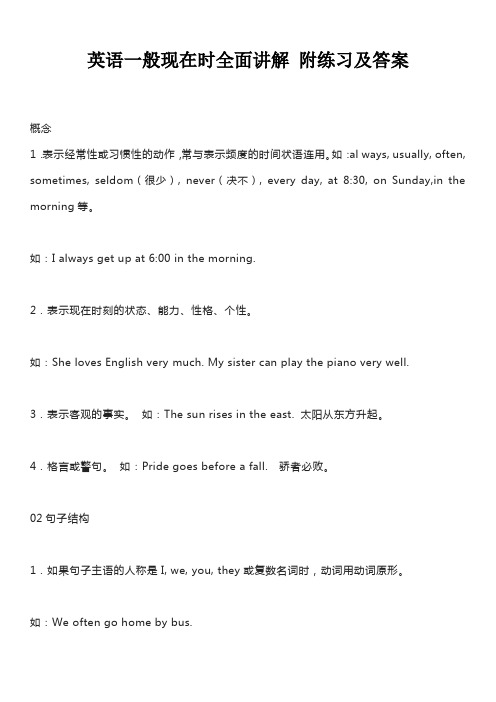
英语一般现在时全面讲解附练习及答案概念1.表示经常性或习惯性的动作,常与表示频度的时间状语连用。
如:al ways, usually, often, sometimes, seldom(很少), never(决不), every day, at 8:30, on Sunday,in the morning等。
如:I always get up at 6:00 in the morning.2.表示现在时刻的状态、能力、性格、个性。
如:She loves English very much. My sister can play the piano very well.3.表示客观的事实。
如:The sun rises in the east. 太阳从东方升起。
4.格言或警句。
如:Pride goes before a fall. 骄者必败。
02句子结构1.如果句子主语的人称是I, we, you, they或复数名词时,动词用动词原形。
如:We often go home by bus.2.如果句子的主语是第三人称单数,即:he, she, it 或单数名词时,动词要用第三人称的单数形式。
如:He often goes home by bus03动词的第三人称单数构成规则1.一般情况下在动词的后面直接加“s”;如:work→works play→plays¬ rain→rains see→sees visit→visits2.以o, x,s,sh, ch结尾的动词,在后面加“es”;如:do→does fix→fixes guess→guesses wash→washes teach→teaches3.以辅音字母加y结尾的动词,先把“y”改为“i”, 再加“es”;如:fly→flies study→studies carry→carries4.不规则变化。
如:have→has04注意在一般现在时的句子中,如果前面使用了助动词does, doesn’t, will, won’t, can, can’t, would, wouldn’t, must, mustn’t 等,尽管主语是第三人称单数,后面的动词用动词原形。
一般现在时知识点和练习(附答案),排版正,可直接打印
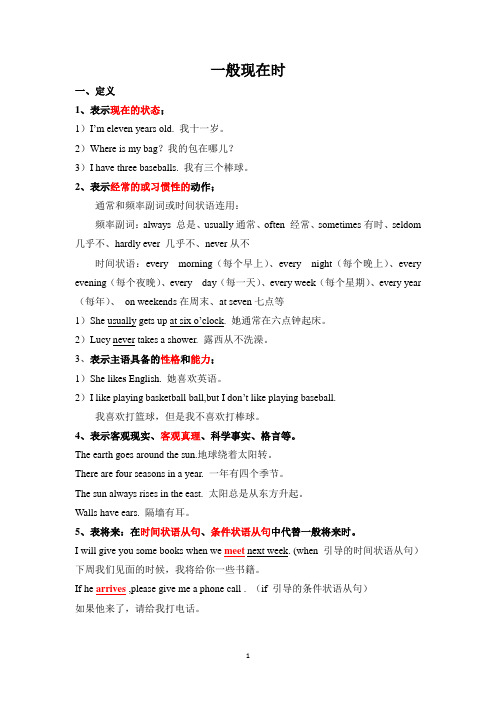
一般现在时一、定义1、表示现在的状态;1)I’m eleven years old. 我十一岁。
2)Where is my bag?我的包在哪儿?3)I have three baseballs. 我有三个棒球。
2、表示经常的或习惯性的动作;通常和频率副词或时间状语连用:频率副词:always 总是、usually通常、often 经常、sometimes有时、seldom 几乎不、hardly ever 几乎不、never从不时间状语:every morning(每个早上)、every night(每个晚上)、every evening(每个夜晚)、every day(每一天)、every week(每个星期)、every year (每年)、on weekends在周末、at seven七点等1)She usually gets up at six o’clock. 她通常在六点钟起床。
2)Lucy never takes a shower. 露西从不洗澡。
3、表示主语具备的性格和能力;1)She like s English. 她喜欢英语。
2)I like playing basketball ball,but I don’t like playing baseball.我喜欢打篮球,但是我不喜欢打棒球。
4、表示客观现实、客观真理、科学事实、格言等。
The earth goes around the sun.地球绕着太阳转。
There are four seasons in a year. 一年有四个季节。
The sun always rises in the east. 太阳总是从东方升起。
Walls have ears. 隔墙有耳。
5、表将来:在时间状语从句、条件状语从句中代替一般将来时。
I will give you some books when we meet next week. (when 引导的时间状语从句)下周我们见面的时候,我将给你一些书籍。
小学英语一般现在时用法知识点

小学英语一般现在时用法知识点哎呀,说起小学英语的一般现在时,那可真是让当时的我们又爱又恨呐!咱们先来说说一般现在时到底是个啥。
简单来说,一般现在时就是表示经常发生的动作或者存在的状态。
比如说,“我每天早上都吃面包”,这就是一个典型的一般现在时的句子,因为“每天早上”是经常发生的事情。
就拿我小时候的经历来说吧。
那时候,老师为了让我们搞清楚一般现在时,可真是费了不少心思。
有一次上课,老师在黑板上写了满满一黑板的句子,全是一般现在时的。
她一个一个地给我们解释,那认真劲儿,就好像这些句子是她最宝贝的东西。
“同学们,看这个句子‘He plays football every weekend’ 这里的‘plays’就是因为主语‘he’是第三人称单数,所以动词要加‘s’。
大家记住了吗?”老师一边说,一边用眼神扫过我们每一个人,好像要确认我们是不是真的听懂了。
我当时坐在座位上,心里想着:这也不难嘛。
结果,一做题就错得一塌糊涂。
我把“she likes apples”写成了“she like apples”,被老师狠狠地批评了一顿。
“你怎么回事啊?刚刚才讲过的知识点,怎么就错了?”老师皱着眉头看着我的作业说。
我低着头,红着脸,心里别提多难受了。
从那以后,我发誓一定要把一般现在时给学好。
每天放学回家,我都会拿出英语课本,把那些一般现在时的句子读了一遍又一遍。
我还会自己造句子,比如说“My mother cooks delicious food every day” 然后再对照着课本检查自己有没有写错。
还有一次,老师组织了一场小组比赛,看哪个小组能最快最准确地用一般现在时造句。
我们小组的小伙伴们都紧张得不行,大家你一言我一语地讨论着。
“我想到一个,‘We go to school by bike’” 一个同学说。
“不行不行,这个太简单了,老师肯定不满意。
”另一个同学反驳道。
最后,经过我们的努力,终于造出了几个让老师都称赞的句子,我们小组还得了第一名呢!再比如说,当我们描述一些客观事实的时候,也会用到一般现在时。
外研小学英语时态练习题

外研小学英语时态练习题在小学英语教学中,时态是学生必须掌握的语法点之一。
以下是一些针对小学英语学生的时态练习题,旨在帮助学生巩固和练习不同时态的使用。
练习题一:一般现在时1. 我每天上学。
(I go to school every day.)2. 她喜欢跳舞。
(She likes dancing.)3. 他们经常去图书馆。
(They often go to the library.)练习题二:一般过去时1. 昨天我去了公园。
(Yesterday I went to the park.)2. 他昨天踢了足球。
(He played football yesterday.)3. 我们昨天晚上看了电影。
(We watched a movie last night.)练习题三:一般将来时1. 明天我要参加生日派对。
(Tomorrow I will attend a birthday party.)2. 她将要学习钢琴。
(She is going to learn to play the piano.)3. 他们下个月会去旅行。
(They will go on a trip next month.)练习题四:现在进行时1. 他正在读一本书。
(He is reading a book.)2. 我们正在看电视。
(We are watching TV.)3. 现在外面正在下雨。
(It is raining outside now.)练习题五:过去进行时1. 昨天下午三点钟,我正在做作业。
(At three o'clock yesterday afternoon, I was doing my homework.)2. 昨晚七点,他们正在吃晚饭。
(At seven o'clock last night, they were having dinner.)3. 他昨晚正在画画。
(He was drawing a picture last night.)练习题六:现在完成时1. 我已经完成我的作业。
小学英语语法一般现在时 包括练习
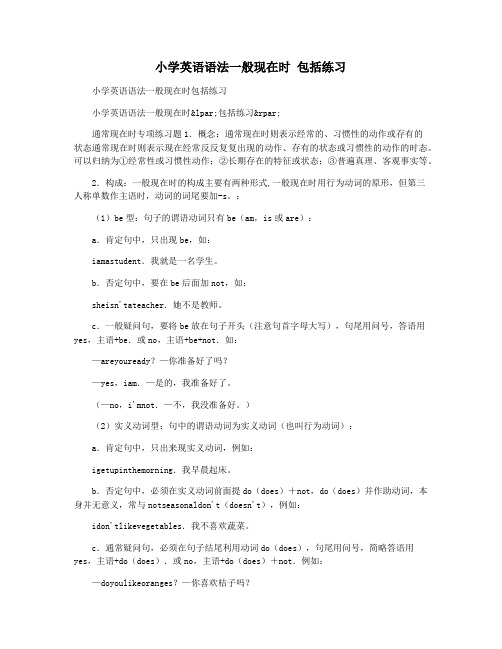
小学英语语法一般现在时包括练习小学英语语法一般现在时包括练习小学英语语法一般现在时(包括练习)通常现在时专项练习题1.概念:通常现在时则表示经常的、习惯性的动作或存有的状态通常现在时则表示现在经常反反复复出现的动作、存有的状态或习惯性的动作的时态。
可以归纳为①经常性或习惯性动作;②长期存在的特征或状态;③普遍真理、客观事实等。
2.构成:一般现在时的构成主要有两种形式,一般现在时用行为动词的原形,但第三人称单数作主语时,动词的词尾要加-s。
:(1)be型:句子的谓语动词只有be(am,is或are):a.肯定句中,只出现be,如:iamastudent.我就是一名学生。
b.否定句中,要在be后面加not,如:sheisn'tateacher.她不是教师。
c.一般疑问句,要将be放在句子开头(注意句首字母大写),句尾用问号,答语用yes,主语+be.或no,主语+be+not.如:—areyouready?—你准备好了吗?—yes,iam.—是的,我准备好了。
(—no,i'mnot.—不,我没准备好。
)(2)实义动词型:句中的谓语动词为实义动词(也叫行为动词):a.肯定句中,只出来现实义动词,例如:igetupinthemorning.我早晨起床。
b.否定句中,必须在实义动词前面提do(does)+not,do(does)并作助动词,本身并无意义,常与notseasonaldon't(doesn't),例如:idon'tlikevegetables.我不喜欢蔬菜。
c.通常疑问句,必须在句子结尾利用动词do(does),句尾用问号,简略答语用yes,主语+do(does).或no,主语+do(does)+not.例如:—doyoulikeoranges?—你喜欢桔子吗?—yes,ido.—就是的,我讨厌。
(—no,idon't.—不,我不喜欢。
六年级英语上册《一般现在时》语法知识点,收藏看一看!
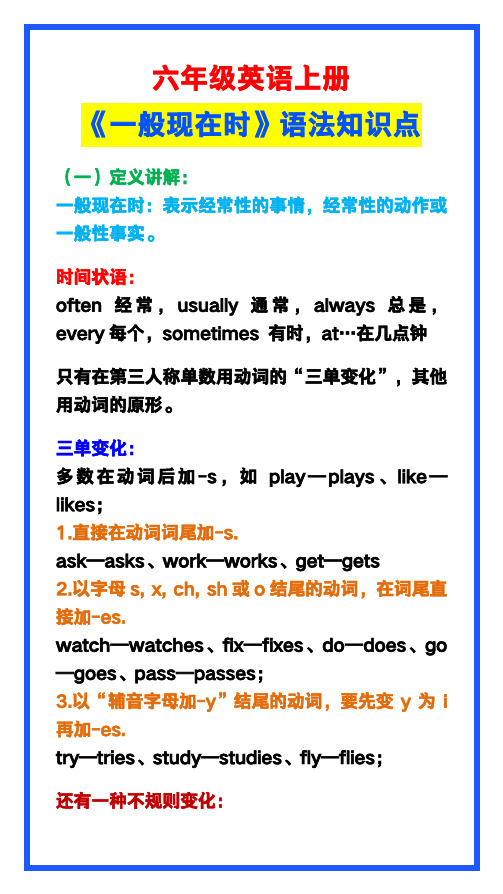
六年级英语上册《一般现在时》语法知识点(一)定义讲解:一般现在时:表示经常性的事情,经常性的动作或一般性事实。
时间状语:often 经常,usually通常,always 总是,every每个,sometimes 有时,at…在几点钟只有在第三人称单数用动词的“三单变化”,其他用动词的原形。
三单变化:多数在动词后加-s,如play—plays、like—likes;1.直接在动词词尾加-s.ask—asks、work—works、get—gets2.以字母s, x, ch, sh或o结尾的动词,在词尾直接加-es.watch—watches、fix—fixes、do—does、go —goes、pass—passes;3.以“辅音字母加-y”结尾的动词,要先变y为i 再加-es.try—tries、study—studies、fly—flies;还有一种不规则变化:be—is are、have—has.六年级英语上册《一般现在时》语法知识点(二)一般现在时用法:1、表示经常性、习惯性、永久性的动作或存在的状态。
通常与副词sometimes、often、usually、always、every day (year、month)、once(twice、three times) a day等时间状语连用。
如:They usually go to school by bike.2、表示客观真理、科学原理、自然现象等客观事实或格言、谚语等。
如:The sun rises in the east and sets in the west every day.(三)一般现在时的句子转换:1.当句子中有be动词或情态动词时,则把be动词或情态动词(can、could等等)提到主语的前面变成疑问句;在be动词或情态动词后面加not变成否定句。
例:①陈述句:She is a student.疑问句→Is she a student?否定句→She is not a student.②陈述句:I can swim.疑问句→Can you swim.否定句→I can not swim.六年级英语上册《一般现在时》语法知识点2.当句子中即没有be动词,也没有情态动词时,则在主语前加助动词do(you以及复数),does(单数she、he、it)变成问句;在主语后谓语动词前加助动词don’t(I、you以及复数),doesn’t(单数she、he、it)变成否定句,助动词后的动词要变成动词原形。
教科版小学英语三起五上Unit 2知识点

【重点考点一】
will + 动原,可用来表示意愿,决心,或者一种习惯性动作如:
Will you stay for dinner?
你愿意留下吃晚饭吗?
They won’t eat anything.
他们决定不吃任何东西。
【重点考点二】
1>grow up 长大成人
2>want to do…想要做…
如:
—What do you want to be when you grow up?
你长大后想成为什么?
—I want to be a painter.
我想成为一名画家。
【重点考点三】
现在进行时VS 一般现在时
1>现在进行时,表示现在正在进行的动作;
结构:be动词+ V-ing
如:
He is drawing a picture now.
他现在正在画一幅画。
Is Amy reading a book now?
Amy现在正在看书吗?
2>一般现在时,表示通常性、规律性、习惯性的动作或状态如:
Jane is in the classroom.
简在教室里。
My father usually gets up at 6:30 a.m.
我父亲通常在早上6:30起床。
3>试理解下列句子
Tom is watching TV now. He always watches TV on Friday. Tom正在看电视。
他通常在周五看电视。
I am drawing a picture. I draw every night.
我正在画一幅画。
我每晚都画画。
- 1、下载文档前请自行甄别文档内容的完整性,平台不提供额外的编辑、内容补充、找答案等附加服务。
- 2、"仅部分预览"的文档,不可在线预览部分如存在完整性等问题,可反馈申请退款(可完整预览的文档不适用该条件!)。
- 3、如文档侵犯您的权益,请联系客服反馈,我们会尽快为您处理(人工客服工作时间:9:00-18:30)。
英语学科课时学习专题学习时间:月日学生姓名:效果评价:一、本次知识点归纳:表达经常性或习惯性的动作、状态、表示真理或客观事实。
二、重要知识点提示:一般现在时需要表示经常性的时间状语例如:always、usually、often、sometimes、everyday、in the morning/afternoon/evening、on Sundays 等。
一般现在时句子构成当主语是 I, we, you, they、复数的人名(Tom and Mike)、复数名词(books)时肯定句:主语+动词原形+其他.否定句:主语+do+not +动词原形+其他.一般疑问句:DO +主语+动词原形+ 其他?肯定回答:Yes, 主语 +do . 否定回答:No, 主语+do +not. 例如:Sometimes we play soccer after class in the afternoon. 当主语为he,she,it、单数的人名(Tom)、单数的名词(book)、不可数名词(water)肯定句:主语+动词三单+其他.否定句:主语+does+not +动词原形+其他.一般疑问句:Does+主语+动词原形+其他?三、经典题训练过关:肯定回答:Yes, 主语 +does. 否定回答:No, 主语+does+not. 例如:---Does he go to school by bike every day? 他每天骑车上学吗?---Yes, he does. / No, he doesn’t. 是的。
/不是。
---What does he want to eat? 他想吃什么?---He wants to eat some rice. 他想吃米饭。
一般现在时的助动词的用法:① do 用于I, we, you, they, 复数的人名(Tom and Mike), 复数名词(books)② does 用于 he, she, it , 单数的人名(Tom), 单数的名词(book), 不可数名词(water)动词第三人称单数的构成基础练习一、单项选择。
()1.---What do you do?---I want to go to the movie.A.want B.want to C.like D.to like()2.---Does the boy want to be an actor?--- .A.Yes,he is.B.No, he can’t.C.Yes, he does.D.No,he isn’t.()3.--- kind of movies Lucy like?---She likes action movies.A.What, does B.What, do C.What’s, does D.Which, do()4.In a word, we can learn a lot Chinese history.A.for B.about C.with D.at()5.Gina likes action movies, she doesn’t like thrillers. A.and B.so C.or D.but()6.I often go to a movie my friends.A.at B.on C.with D.in()7.I don’t like action movies. I think they’re.A.boring B.difficult C.interesting D.exciting()8.Let’s a film!A. seeB. lookC. haveD. look at()9.Bill likes edies, but he thrillers.A. likeB. likesC. don’t likeD. doesn’t like()10.the old man like Beijing Opera?A. IsB. DoC. AreD. Does()11.We have great fun in the school trip. It’s really .A. sadB. scaryC. difficultD. exciting()12.--- you speak English?---Yes, I can.A. DoB. AreC. CanD. Does二、阅读下面短文,根据短文内容,从每题所给的A、B、C、D 四个选项中,选择可以填入空白处的最佳答案。
John really likes action movies, and 1 often goes to 2 Chinese action movies. He thinks they are very 3 . He 4 documentaries are boring, and 5 doesn’t like thrillers.He thinks they are 6 . He 7 likes Beijing Opera. Some people don’t like it, 8 he thinks it is very interesting. He thinks he can 9 about Chinese history. He often goes tosee Beijing Opera 10 his father.()1. A. she B. he C. we D. they()2. A. see B. read C. look D. hear()3. A. tiring B. boring C. scary D. exciting()4. A. wants B. thinks C. sees D. gets()5. A. I B. She C. He D. We()6. A. exciting B. relaxing C. tiring D. scary()7. A. Too B. either C. also D. and()8. A. and B. so C. or D. but()9. A. read B. learn C. see D. like()10. A. or B. with C. and D. but三、根据句意,用括号内动词的正确形式填空。
1. She often (want) (see) the movie.2.I usually (like) (watch) TV.3. He (have) some ice cream every day.4. She (not watch) TV every day.5.We (give) a concert each year.6.My father (watch) TV in the evening.7.He often (go) to movies.8.They (stay) at home on Sunday.9.They (not like) edies, but I like edies because they are interesting.10. Ann (go) to school every day.巩固提升一、单项选择()1. Jack wants the park.A. go toB. to goC. to go toD. goes to()2. My brother likes action movies he doesn’t like documentaries.A. and B. but C. or D. so()3. On weekends, I often go to movies my friends.A. forB. withC. atD. of()4. Jack often seven classes every day.A. haveB. doC. hasD. does()5 ---- kind of movies do you like?--- Action movies.A. WhatB. WhoC. HowD. When()6 ---- do you usually go to a movie?---On weekends.A. WhatB. WhenC. WhereD. How()7. I like because I can know Chinese history.A. action moviesB. Beijing OperaC. ediesD. thrillers()8. I like to see the edy.A. relaxingB. boringC. sadD. scary()9. I don’t like action movies. I think they’re ..........A.boring B.difficult C.interesting D.exciting()10. — How is the new movie?— It is .........A.well B.thriller C.young D.exciting()11. Do you like books?A.read B.reading C.see D.seeing()12. Mr. Brown is very old, he is still healthy.A.but B.and C.so D.for()13. My brother this kind of story-books.A.have B.don’t have C.doesn’t has D.doesn’t have()14. Do you often go to football games your friends?A.see, and B.look at, with C.watch, and D.watch, with()15. He even a Beijing Opera artist.A.want to be B.wants to be C.want is D.is want二、按照要求改写句子1.Daniel watches TV every evening.(改为否定句)。
2.I do my homework every day. (改为一般疑问句,并作否定回答)3. She likes milk. (改为一般疑问句,并作肯定回答)4. Amy likes playing puter games.(改为一般疑问句,并作否定回答)5. We go to school every morning.(改为否定句)6. He speaks English very well.(改为否定句)7. I like taking photos in the park.(对划线部分提问)8. John es from Canada.(对划线部分提问)9. She is always a good student.(改为一般疑问句,作否定回答)10. Simon and Daniel like going skating.( 改为否定句 ) 11. Do you often play football after school? (肯定回答)_12. I have many books. (改为否定句)13. Gao Shan's sister likes playing table tennis.(改为否定句)一、看字写拼音(你能写正确吗?)嗡( )朗润( )酝酿( ) 卖弄( )喉咙( )应和( )嘹亮( ) 烘托( )静默( )风筝( )抖擞( ) 健壮( )呼朋引伴( ) 花枝招展( ) 镶()单单()安适()着落() 慈善()肌肤( ) 秀气( )宽敞( )空灵( )贮蓄( ) 澄清( ) 地毯( )蝉( )花苞( )娇媚( )彩棱镜( )粗犷( ) 睫毛( )衣裳( )铃铛( ) 端庄( )静谧( ) 屋檐( ) 凄冷( )化妆() 莅临 ()造访() 吝啬( )淅沥()干涩()草垛() 绿茵茵 () 咄咄逼人( )二、看拼音写汉字(他们可是很难的哦!挑战一下吧)tān huàn bào nùchén jìshìnòng chuídǎ( ) ( ) ( ) ( ) ( )qiáo cuìyāng qiúxùdāo juébiédàn yǎ( ) ( ) ( ) ( ) ( )gāo jiélàn màn fān lái fùqùxǐ chū wàng wài ( ) ( ) ( ) ( ) xìn fúfēn qíqǔjuéyīshàliǎng quán ( ) ( ) ) ) ) lín lín gèdéqísuǒdìgěn nì xiào mùdǎo gào zǐmèi(tíng )páihuá)zhē bì)xīn) )liúzhuǎn yīn bì)( ) ) ) ) ) )三、古诗文默写:(你还会背吗?)(1) 水何澹澹,。
